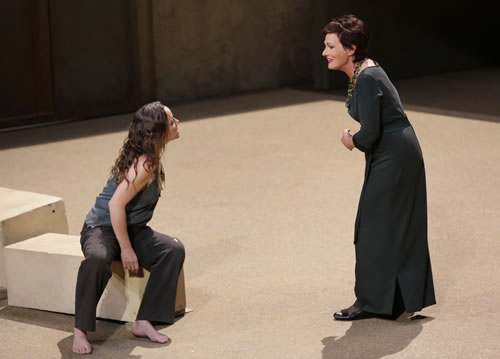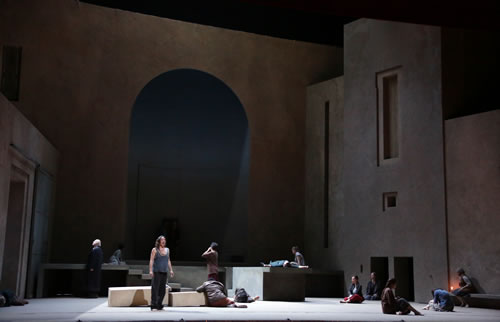New York, Helsinki, Berlin and Barcelona audiences will have the privilege of seeing this landmark production
Opera companies worldwide are currently celebrating the 150th anniversary of the birth of Richard Strauss. His Elektra was recently staged at La Scala in a production originally directed by Patrice Chéreau. This great director passed away last October His forays into this medium were not all that frequent. His landmark production of Wagner's Ring in 1976 at the Bayreuth festival was initially reviled but eventually acclaimed as one of the most dramatic Ring's of all time. Elektra was Chéreau's last operatic creation and debuted to great acclaim at France's 2013 Aix festival.
The plot, based on Hugo von Hofmannsthal's play relates to the obsession of Elektra to avenge her father Agamemnon who was murdered by her mother, Klytämnestra, and her mother's lover, Aegisth.
The curtain rose to silence with Klytämnestra's servants performing their mundane tasks of sweeping and cleaning the palace. Then suddenly without warning came the dramatic orchestral entry. This powerful beginning was absolutely spell-binding. Vocally, pride of place goes to Evelyn Herlitzius, who gave a towering, riveting and totally committed portrayal of Elektra, one of the repertory's most challenging roles. Dressed in loose-fitting pants and a T shirt, this consummate actress danced round like a woman possessed, emphasizing that her sole raison d'être was to avenge her father's murder.
Klytämnestra, the odious mother usually projects hatred. Here, mezzo soprano, Waltraud Meier, rendered her as more humane, possibly even too sympathetically. Meier's interpretation was somewhat subdued and on occasion, her voice was drowned out by the massive orchestral forces.
 Evelyn Herlitzius (Elektra) and Waltraud Meier (Klytämnestra) in Richard Strauss's Elektra. Credit Brescia/Amisano - Teatro alla Scala
Evelyn Herlitzius (Elektra) and Waltraud Meier (Klytämnestra) in Richard Strauss's Elektra. Credit Brescia/Amisano - Teatro alla Scala
Adrianne Pieczonka was also very effective as Elektra's more feminine sister, Chrysothemis. She is the only member of the dysfunctional family who is able to muster emotional feelings of hope and love. She wants nothing more than to escape from the palace, lead a normal life and have children. She brought out tenderness and pathos in her outstanding portrayal of the role. But all her entreaties to Elektra were of no avail.
Rene Pape took on the role of Orest, the third sibling. Prior to curtain rise it was announced that he had some vocal problems but nevertheless agreed to perform. This was a mistake and this incomparable bass did credit neither to himself nor his audience.
The smaller secondary roles were exemplary. These included Donald McIntyre as an old servant, the 90 year old Franz Mazura as the guardian of Oreste, and soprano Roberta Alexander as the Fifth Maid. Finish conductor, Esa-Pekka Salonen succeeded in bringing out all the dramatic dissonances inherent in the score. The orchestral accompaniment was truly magnificent.
One of the most dramatic climaxes occurred when Elektra realizes the intruding stranger is her brother, Orest. In this poignant scene one could feel the weight of responsibility removed from Electra as "big brother" will now take matters in hand and mete out the appropriate punishment on their mother and her lover. In most productions, Elektra dances herself to death after the murder of her mother and Aegisth. Not this time. Here she remains seated, immobile, frozen in time in a trance. A dramatic finale to a shattering performance.

 Concluding scene of Richard Strauss's Elektra. Credit Brescia/Amisano - Teatro alla Scala
Concluding scene of Richard Strauss's Elektra. Credit Brescia/Amisano - Teatro alla Scala